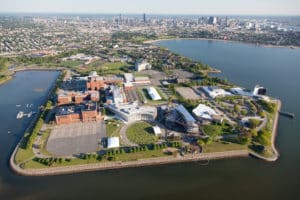While prices of trophy commercial buildings have plateaued and transaction activity has cooled in Boston, one real estate category is testing new limits of what investors are willing to pay for a chance at a monster payoff down the road.
Four redevelopment parcels totaling over 63 acres – all located a short ride on the Red Line from downtown – are on the market, offering a blank slate for new office, lab and residential projects. But each has limitations, as well as uncertainties about how much density will be allowed, adding an element of guesswork to the bidding wars.
Disposition processes are moving forward for the New Boston Food Mart wholesalers’ Widett Circle property, the former Bayside Expo Center parcel, Gillette Co. parking lots and the city’s Frontage Road tow lot.
With the commercial real estate market now in the eighth year of a recovery, it makes sense for developers to consider land acquisitions that could take years to permit and build out, said Christopher Sower, a senior vice president at Colliers International in Boston.
“The way a lot of groups look at it right now; they might not be developments in this cycle,” Sower said. “It might be a little longer-range perspective, but the locations are dynamite and the zoning gives them some level of comfort. A lot of these sites don’t have existing neighbors, as opposed to places like Back Bay and Allston where there’s strong neighborhood groups.”
 Cambridge Properties Set New Records
Cambridge Properties Set New Records
Life science developer Biomed Realty’s $50.5 million purchase of a 0.8-acre vacant lot at 585 Third St. in Cambridge’s Kendall Square in August set a high water mark at over $63 million per acre, reflecting a rare opportunity to grab a development site in the life science capital.
Less than a block away, MIT’s $750 million purchase of the U.S. Department of Transportation’s Volpe Center property in 2017 topped $53 million per acre. The price reflected MIT’s long-term investment horizon and East Cambridge’s record-setting commercial rents. Asking office rents now top $96 per square foot and asking lab rents of nearly $93 per square foot, according to research by CBRE/New England. Cambridge officials subsequently approved 1.7 million square feet of commercial development and 1,400 housing units for the 14-acre site.
By contrast, Alexandria Real Estate Equities appears to have gotten a relative bargain on another Kendall Square property, paying around $22 million per acre for the former Metropolitan Pipe & Supply Co. parcel on Binney Street. Alexandria has not submitted any plans since acquiring the 4.3-acre property in April 2017.
Prices are lower along the South Boston-Dorchester Red Line corridor, but industrial properties eyed for redevelopment as housing or commercial space have attracted unsolicited offers. Low-density commercial properties and surface parking lots offer a chance to replicate some of the Seaport District and South End’s successes in leasing up class A office space and luxury multifamily developments.
Newton-based National Development paid nearly $111 million in September for 4.3 acres on Dorchester Avenue in South Boston, currently occupied by the construction equipment vendor Marr Cos. National Development has not disclosed its plans for the property.
The Boston Planning and Development Agency has accelerated its review timelines since Boston Mayor Marty Walsh took office in 2014, giving investors more confidence about acquiring properties without permits in hand, said Niko Skiades, an executive vice president in JLL Boston’s capital market group.
“Developers are willing to put more predevelopment dollars at risk,” Skiades said.
Widett Circle ‘Very Close’ to a Deal
The year-long marketing of the 19-acre Widett Circle illustrates one complication of sites with businesses that need to relocate: finding a good replacement location in land-starved Boston. The food wholesalers cooperative requires short transportation routes to their restaurant customers, and approximately 300,000 square feet of high-bay storage and distribution space. Such sites are in short supply in the urban core.
“There are great development sites that have operating businesses on them, and these sites are getting bought up and there’s fewer places where they can relocate to,” Sower said. “That can be the most complicated part of the transaction.”
The Widett property is zoned for 1.7 million square feet of development by right. One factor that might give potential buyers pause: it’s one of the state’s potential locations for a commuter rail layover yard required as part of the South Station expansion project. But a source familiar with the process said the food wholesalers are “very close” to a deal. Brokers for HFF and Cushman & Wakefield, which are handling the sale, had no comment.
On the edge of the booming Seaport District, Gillette Co. is ready to cash in on its longtime real estate holdings as it offers up 6.5 acres of surface parking on the eastern edge of its 40-acre campus. Marketed by JLL Boston, the property borders the future General Electric headquarters, including a pair of vacant warehouses acquired by MassDevelopment for $57.4 million in 2016.
And at Dorchester’s Columbia Point, UMass Boston officials are about to find out how much the value of the former Bayside Expo Center property has appreciated since they acquired it in 2010 for $18.7 million from LNR Partners. Newmark Knight Frank is marketing the waterfront property, which has an estimated buildout of 2.5 million square feet.

Steve Adams
Political realities are expected to play into the development program for another big publicly owned parcel on the Red Line corridor: the city-owned tow lot and municipal vehicle repair shops on Frontage Road. City Councilor Michelle Wu predicted the council will demand a say over affordable housing and open space requirements, which could limit the density of the buildout and make the 18-acre property less profitable to the eventual buyer.




 |
| 

